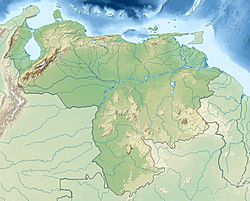Cerro Avispa facts for kids
Quick facts for kids Cerro Avispa |
|
|---|---|
| Highest point | |
| Elevation | 1,600 m (5,200 ft) |
| Geography | |
| Location | Amazonas, Venezuela |
Cerro Avispa is a unique flat-topped mountain, known as a tepui. It is found in the Amazonas state of Venezuela. This special mountain is part of a larger group called the Neblina–Aracamuni Massif.
Contents
What is Cerro Avispa?
Cerro Avispa is a type of mountain called a tepui. Tepuis are like giant tables made of rock. They have very steep sides and flat tops. These mountains are often found in the Guiana Highlands of South America. Many tepuis are very old, dating back millions of years.
Location and Neighbors
Cerro Avispa is located in a remote part of Venezuela. It sits south of another large tepui called Cerro Aracamuni. These two mountains are very close and even share some of their lower slopes. To the north of Cerro Avispa is Cerro de la Neblina, another famous tepui.
Size and Height
Cerro Avispa and Cerro Aracamuni together form a large mountain area. Their flat tops cover about 238 square kilometers (92 square miles). The total area, including their steep sides, is much larger, around 658 square kilometers (254 square miles). Both of these "table mountains" reach a height of about 1,600 meters (5,200 feet). This makes them quite tall, especially when compared to the surrounding lowlands.
Why are Tepuis Special?
Tepuis like Cerro Avispa are very important for science. Their flat tops are often isolated from the ground below. This means that unique plants and animals can evolve there. Many species found on tepuis are found nowhere else on Earth. It's like a lost world on top of a mountain!
Unique Ecosystems
The high, flat tops of tepuis have their own special weather. They often get a lot of rain. This creates many waterfalls and streams. The soil is usually poor, but many plants have adapted to these conditions. Some plants, like the Heliamphora (sun pitcher plants), even eat insects to get nutrients.
Exploration and Discovery
Because tepuis are so hard to reach, many of them have not been fully explored. Scientists often need helicopters to land on their flat tops. Each expedition can discover new types of plants and animals. This makes places like Cerro Avispa very exciting for researchers.
See also
 In Spanish: Cerro Avispa para niños
In Spanish: Cerro Avispa para niños
- Distribution of Heliamphora
 | James Van Der Zee |
 | Alma Thomas |
 | Ellis Wilson |
 | Margaret Taylor-Burroughs |


